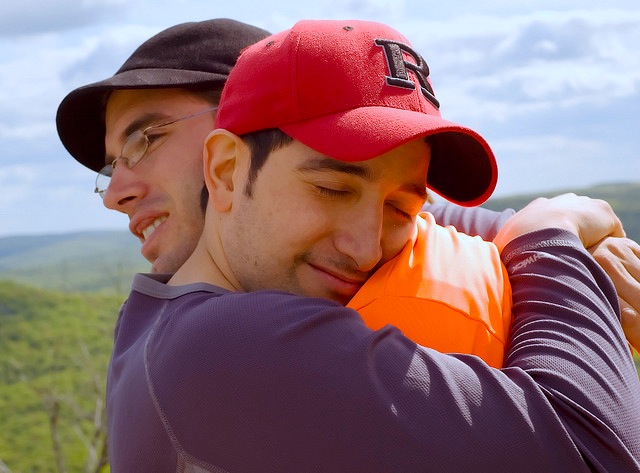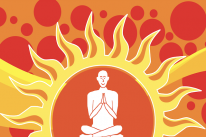
“Wisdom is nothing more than healed pain.” ~Robert Gary Lee
As the only child of a single parent, my family of two was small and our relationship could be intense.
My southern belle mom, with her stories and easy laugh, her quick wit, and her love of all things literary was the mom who all my high school friends adored and loved—the one who my teenage friends could talk to when they were too angry or irritated with their own mother.
I loved her too, but I also worried about her. A lot. Because I knew a secret about her that no one else did: she was an alcoholic. Not a big, scary, yelling, hitting alcoholic, but a quiet, light dimming, slow fade alcoholic.
My mom loved me, she provided for me, but her own grief and story about her past could take over her brain and take her far away, down into her beer bottle, along with her ever present cigarettes.
When she told me during my senior year of college that she was entering outpatient chemical dependency treatment, that heavy weight of worry felt lifted from my shoulders. I hoped that this would give her a chance at a happier life.
As my mom healed, I did too, and got more of my own life in action. I went to graduate school and moved across the country and back. I started a relationship with the man who would become my husband. I got my first real professional job.
So when the pain in her leg was diagnosed as cancer—terminal stage 4 Lung Cancer, spread to her bone, with a prognosis of six months to live—it was a huge blow.
Through six months of treatments that left her tired and nauseated, she persevered. But then another blow, though not the one I anticipated: leaving a doctor’s appointment, she had a stroke and fell down unconscious in the parking lot.
The drive from my house to the hospital where she was taken was one of the longest four hours of my life, not knowing what awaited me at the end.
After three hard weeks of physical therapy, my mom returned home. But she wasn’t the same. The parts of my mom that I and others most valued and relied upon—her humor, empathy, and listening ear—were gone, stripped away by the stroke like a cheap veneer, never to return.
And while she wasn’t drinking or smoking any more, my worry returned, not knowing when the proverbial other shoe would drop. Was she really able to live alone in a two-story house? Was I being a bad daughter by not moving back to my hometown to care for her?
On top of the worry, the impact of the stroke was a bitter pill to swallow. While others marveled at her longevity with such an advanced cancer diagnosis, I felt guilty and angry: the whole situation felt like a rip-off. My mom was still alive, but it was hardly much of a life, in my opinion.
I wondered why she was still alive, when she was barely able to enjoy the life she was leading.
Before her stroke, I’d clung to some romantic notion that her illness might give her opportunity to finally make sense of the hardships she’d endured through much of her life.
I cared for her the best I could from afar, knowing that it was less than ideal, and I continued to craft my own independent life, as well. Over the next eight years, I married my boyfriend, got promoted at work, and got pregnant with my first child.
Throughout my pregnancy, my mom had more troubles—a heart attack and increased breathing problems. The day we brought our newborn son home from the hospital, my mom called saying she was in the hospital with shortness of breath.
Instead of relishing the first sweet days of my son’s life, my first days of parenthood were flooded with the same familiar worry, guilt, and anxiety.
My mom spent the next three weeks bouncing between home, hospital, and residential hospice.
She clearly was in denial about what was happening to her: as the survivor she was, she saw it as just another difficulty to overcome, anticipating another victory in her long triumph over cancer. She struggled and resisted what was happening to her.
This time, she couldn’t outrun it: I held and stroked her sweet hand as she took her last breaths, and nursed my baby five minutes later.
In the ten years since my mom’s death, I’ve realized the person who needed to learn and transform from her illness and death wasn’t her: it was me.
My worry, judgment, guilt, fear, and anxiety couldn’t fix the past, cure her cancer, or protect us from the future. Those emotional states and feelings only could inflict more pain, distance, and suffering.
Throughout my mom’s life, including illness and death, all I could do was be with her and love her, as best I could, from moment to moment. Our loving presence with each other was often the most useful medicine for either of us during the hardest times.
Because no matter how much we might wish otherwise, there will always be some difficult times in life. It’s pretty much a guaranteed part of the deal with being a human.
So when you or someone you love is hurting or suffering, rather than trying to outrun any difficult feelings, such guilt, worry, judgment, fear, or anxiety, see if you can stop and find a grounding place within yourself, such as the regular rhythm of your breath.
See if you can even briefly be present to the hurt or suffering, as unpleasant as it may be, without needing to change it.
In first witnessing and just simply being present to our own or others’ difficulties, rather than automatically trying to change or fix the situation, we are of great service and can create deep healing in ourselves and others.
Through being with the situation, as it is, we can also better discern what our next best actions should be.
Instead of getting caught up and carried away by intense emotions, disappointments, grief, anxiety, or any other difficulty, being with the experience as it is and doing as best we can in that moment is often the quickest and least painful way through challenging times.
Regardless of what difficulty your loved ones face, trust that your loving presence is all that is required. And know it is completely enough.
Photo by David Goehring
About Hanna Cooper
Hanna Cooper is a certified professional coach for do-gooders who want to do more good, and writes a regular blog with leadership insights at www.hannacooper.com She’s also at work on a memoir about lessons from intersection of death and life. Connect with her also on Twitter @HannaCooper or Facebook www.facebook.com/HannaCooperPage.













 Though I run this site, it is not mine. It's ours. It's not about me. It's about us. Your stories and your wisdom are just as meaningful as mine.
Though I run this site, it is not mine. It's ours. It's not about me. It's about us. Your stories and your wisdom are just as meaningful as mine.
What a beautiful post…thank you so much for sharing this. Having gone through some difficult losses I can attest to the power of a friend who can simply stand with you as you grieve. Who can “bare witness” to your pain without fixing, taking sides or taking responsibility for your suffering. I am so grateful to those family and friends who have been there for me. I’ve also learned that not everyone can do this. Perhaps their own wounds are too painful or another’s pain poses some form of threat to them.
Stephen, thanks so much for your comment, and sharing your experience as well. I love your gratitude for those who can witness pain with us, and so true that not everyone can walk this type of path with us, or at least not every time. I love your reminder to have compassion for them as well, for as you say we may not have their whole story. Thanks for your insight!
Thanks for the post. I’m going through a very difficult situation with my dad right now. He’s having severe health problems and declining badly. He had a stroke a few weeks ago, a mini stroke a few days ago and is in the hospital right now with pulmonary embolism. I struggle with what to say to him. I think he’s looking so bad and he might die soon. Like you said in the post i guess the best thing i can do is just be with him during this difficult time.
Austinguy, I’m sorry to hear about your Dad – no matter what our age or circumstance, this is never easy. I’m sure you are a gift to him no matter what – your presence alone is helpful and comforting. Please take good care of you as well – I’m sending good wishes your way.
Hanna, what a beautiful and heartfelt post.
I think your honesty will help a lot of people heal. Thank you for sharing your story.
Thank you, Adrianne… this is a gift from my heart and if it is useful to others, I will be grateful and honored. Thanks for commenting!
Hanna, thanks for taking the time out to write out your story. Your ability to reflect on what happened and to learn from those experiences is a skill that everyone–including myself–must foster and develop. But it’s interesting how when I finished reading your post, I felt as if your story reflected your mother’s strength. From what it sounds like, she was a fighter. The fact that you balanced a life, job, relationship, a child, all while this was happening, it’s amazing to see what similarities exist between a mother and her child.
Thanks again for the reminder. Life is truly too short to allow temporary external factors take away from the fact that we’ll never get back the second we just wasted on not appreciating what was there. It’s a constant battle, but the reminders are always a breath of fresh air
Gwang, thank you for your thoughtful and heartfelt reply and reflection – you’ve touched me deeply with your response. Indeed my mother was a very strong and amazing person – and I learned well from her. I was lucky to be her daughter. And we are more than our stories, indeed! Thank you for being a breath of fresh air yourself in this dialogue, right here, right now.
Hanna, I just spoke to my weight loss students about a profound experience of mine, where a friend simply sat with me as I processed a huge and overwhelming grief. No one in my life had ever done that for me, just BEEN there. To this day, it is one of the great joys and memories I have (even though it was a devastating sadness I felt). It occurs to me you and your mother had an agreement before this life… for you to be there in that moment for her. Because that’s what she needed. Because that’s what you needed. You fulfilled your destiny with her in that moment. The only word that comes to mind is “perfect.”
Pat, it’s great to hear your example of the healing gift of presence – it is far too rare. Thanks too for your insight – while it was one of the most difficult moments of my life, it isn’t one I would trade, and has made me who I am today.
Thank you for this message!! Practice and awareness that being present in the pain, discomfort, etc. is all that is needed…Such a relief to hear that, I appreciate this reminder!! (a definite challenge for me since I am a “fix it” person) I love when you said….”Regardless of what difficulty your loved ones face, trust that your
loving presence is all that is required. And know it is completely
enough.”
Thanks, lv2terp – I’m so glad if it resonated for you! Caring people want to help, and sometimes fix, and really our open hearted presence is usually what is most healing.
Such a great metaphor for life in that 10 minutes. Saying goodbye to someone and providing life for someone else. Thanks for sharing.
So true, Josh. Those 10 minutes woke me up, and changed my life entirely (that’s whole other story). Wouldn’t have signed up for that program and yet wouldn’t give up the lessons I learned as a result.
Thank you for this beautiful, honest story, Hanna. i remember seeing the note that said “breathe” stuck to your office bookcase and now it has special meaning. Your mother was clearly a beautiful and strong woman and you learned so much from your experience as her daughter.
Thank you, Gretchen – your words mean a lot to me, coming from you, as another strong and beautiful woman who I respect so much! Yes, back in those days, I found I held my breath when I was stressed and had to remind myself to take an actual breath! My mother was an amazing person – funny, smart, witty, loving, loyal, generous – and I am truly lucky to have been her daughter.
It is posts like this that remind me how NOT alone we are in this world. There are others that have experienced similar events & have an appreciation for the things we are going through, even though we all deal with & process things somewhat differently, there is a whole lot similar.
My mum spent 9 months in hospital a few years back, starting from a fairly routine surgery (as surgeries go), to nearly dying – with very uncertain outcome, to a lot of rehab with the expectation she would need a semi-care facility, to blessedly being able to live on her own & do pretty close to everything she used to be able to do. I worked full time throughout, and visited her every day, until she was well enough to tell me off & then I’d come every second day. 🙂 The funny thing is that as difficult as that was, and I was dealing with some difficult stuff otherwise as well, I have so many great memories now of just being able to enjoy sitting in her room with her, or being “in the moment” on my walks to/from the bus, or hanging with my now-departed & beloved aunt, whose greatest gift to me were her hugs & unspoken understanding & support. (Hope I was able to give her the same…) Would I want to go through that all again? Unequivocally NO, but at the same time, I learned, grew and strengthened because of it. And became closer to my mum, too… not that we weren’t close already. And I do fear for the day my mum is no longer on this earth, but I enjoy my time with her all I can, and I know I’ll be fine… in time.
Best wishes, positive thoughts, and virtual hugs & kleenex, to you all.
Thanks for sharing your story too, BayRatt – so true that we aren’t alone, and that by sharing our stories we can find that common thread. Best wishes to you as well!